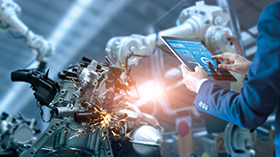

South Africa has positioned itself as a prime manufacturing hub on the African continent, with its industrial manufacturing industry serving as a crucial multiplier of economic growth, an engine of development and a significant contributor to the country’s GDP. In 2022, the sector contributed 11,4% towards the overall GDP (R3 trillion). Today around 1,5 million people work in industrial manufacturing, and are witnessing progression at a rapid pace within the sector.
Vinesh Maharaj, PwC South Africa’s smart manufacturing lead, says: “New technologies are changing the face of manufacturing. Factories are becoming increasingly connected, as machines talk to one another and to humans, and automation reaches new milestones, with robots becoming more independent. This has understandably left groups of employees jittery over 4IR’s impact on job security and changing roles.
“In our latest thought leadership article we explain that exciting disruptions within the sector are causing business leaders to pivot due to the rapid innovation of new digital technologies such as IIoT, AI and machine learning. We are also seeing that what is being manufactured and how it is produced is also changing. For example in the automotive manufacturing industry, there is a global shift to hybrid and eco-friendly vehicles. Given the pace at which today’s industrial and technological evolution is moving, it is pertinent for business leaders to consider their impact on the future of work and what this means for the workforce.”
Marthle du Plessis, PwC Africa’s Workforce of the Future platform leader, says: “Sustainability considerations are increasingly important, as companies seek to reduce their environmental footprint and improve their social impact. Developing green skills among employees is crucial to achieving these goals and creating a sustainable future. From an industry lens the global industrial manufacturing sector understands the importance of upskilling their employees on the importance of green skills. However, South Africa has some way to go towards seeing it as an important skill.”
“PwC’s latest Global CEO Survey highlights that investors are more likely to invest in companies that efficiently manage sustainability risks and opportunities, and 79% agree that the consideration of sustainability risks and opportunities is a significant factor in their investment decision making,” Maharaj says. “Therefore, sustainability is essential, not only from an impact point of view, but also in attracting investors.”
Sustainability should be of crucial importance to local business leaders, as South Africa’s relative passivity in decarbonisation efforts makes it the most carbon-intensive country within the G20. “The case for change is real, and industrial manufacturing companies need to re-look at their sustainability strategies, and establish how to enable their workforce to execute them.”
This article outlines four ways this can be done. It is also important to bear in mind the buy-in that is needed from the C-suite to the shop floor, and in the realignment of the entire workforce.
Creating a digitally-enabled and connected workforce
The fourth industrial revolution comes with a wealth of technology that brings opportunities for production cost reduction, productivity and earnings improvement, and the development and introduction of new business lines. Despite this, almost three quarters (72%) of South African workers have said they are concerned that automation is threatening many jobs.
“While it is expected that there will be a decline of repetitive tasks for assembly and factory workers, material handlers and many other roles, the decline will be the informal sector,” Maharaj says. This is supported by a 2023 World Economic Forum report which asserts that technology adoption will remain a key driver of business transformation, counterbalanced by an increase in new, often formal, wage jobs being created, especially in the service sectors, and at a faster rate. It will also result in earnings improvements in in the next five years.
“Creating a digital transformation journey through the use of a variety of applications and technologies will empower, retain and attract the workforce,” Du Plessis says. “The effective implementation of this is likely to increase efficiency, decrease cost, improve customer experience, and facilitate a company’s growth.” Very importantly, Du Plessis emphasises that negatively impacted staff need to be given the first opportunity to be trained into occupying the new jobs created. “This will require three to five year planning horizons through a robust strategic workforce planning strategy,” she says.
South Africa’s competitors are all adopting 4IR technologies and developing their workforce. If the country’s industrial manufacturing sector fails to follow suit, it will continue to fall behind and deindustrialise. Leaders need to invest in strategies which are more technology and sustainability focused in order to create a culture that will help them stay relevant, attract and retain employees, improve productivity and make an impact, both inside and outside of the workplace.

© Technews Publishing (Pty) Ltd | All Rights Reserved